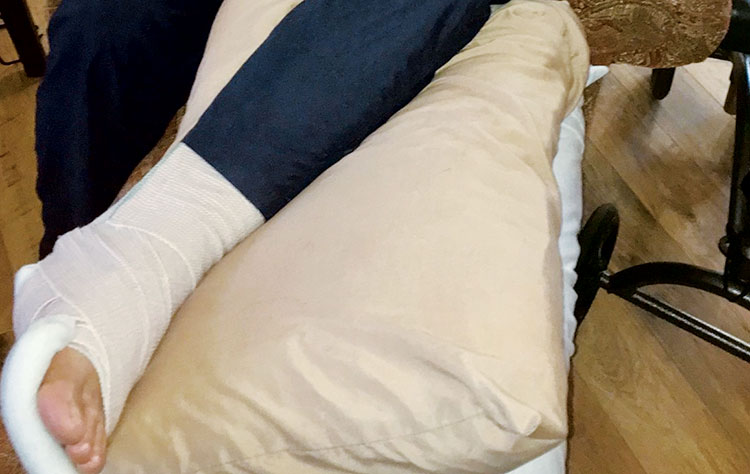By Jack O’Malley, WTCM 103.5 FM Traverse City and host of Jack’s Journal on 9 & 10 News
“Well, Jack,” said the doctor, examining my foot while studying X-rays of my heel. “If that tendon tears, it’s going to be a bear to fix. You need foot surgery.” Not one to argue, I took his advice.
In the days prior to surgery, I prepared for my recovery: two to four weeks off my feet, hobbling unsteadily on crutches and learning how to steer my scooter, followed by a week or two walking with a cane.
“Easy enough,” I thought. With a foot brace, prescriptions and disability parking permit in hand,
I was feeling confident!
After a relatively pain-and-incident-free first few weeks, I had mastered the dance—juggling my brief case, foot brace, scooter and crutches, jostling them in and out of the car, all while balancing on one leg. Lugging everything through a near freezing parking deck at least twice per day, I quickly tired of the hassle. But the end was near! Soon the doc would give me the all-clear, and it would be just me, my brief case, and my intricately-carved, walnut-stained Beechwood walking cane, which was an accessory I hoped would offer an air of distinction (unlike my scooter).
But then, a complication—a complication setting my recovery back at least two weeks. And then another setback.
In mid-December, with mobility still dependent on the knee scooter and crutches, my wife and I attended a music program in search of some much-needed holiday cheer. Entering an auditorium brimming with families, grandparents and students, we noticed all handicapped-accessible rows were full, many seats occupied by young children. While obvious I couldn’t use the stairs, no one moved. Dismayed, I found a folding chair by the entrance while my wife took a seat elsewhere in the auditorium.
Initially frustrated at being separated from my wife, I paused. Since surgery, folks had repeatedly grabbed doors, held elevators and carried bags for me. While some were oblivious, the vast majority of those I “bumped” into kindly offered assistance. Plus, I had a light at the end of the tunnel. I would recover. Eventually.
Yet this situation forced me to ask a tough question. What about those people suffering permanent disabilities, many of whom regularly experience these types of situations? What about people discouraged from going out because of limited parking and seating, who feel uncomfortable asking for help, overburdened with medical equipment, and just overwhelmed with the situation in general?
Though I’m still not 100 percent, doctors assure me I’ll make a full recovery. In the meantime, my respect and appreciation for those with a permanent physical or cognitive disability has only deepened. My hope now is to encourage others to think twice when in public. Save those reserved parking spaces and seating sections for those people and families who could really use it. Open a door, offer a seat, and give a smile to someone who genuinely needs it. I know I will.






